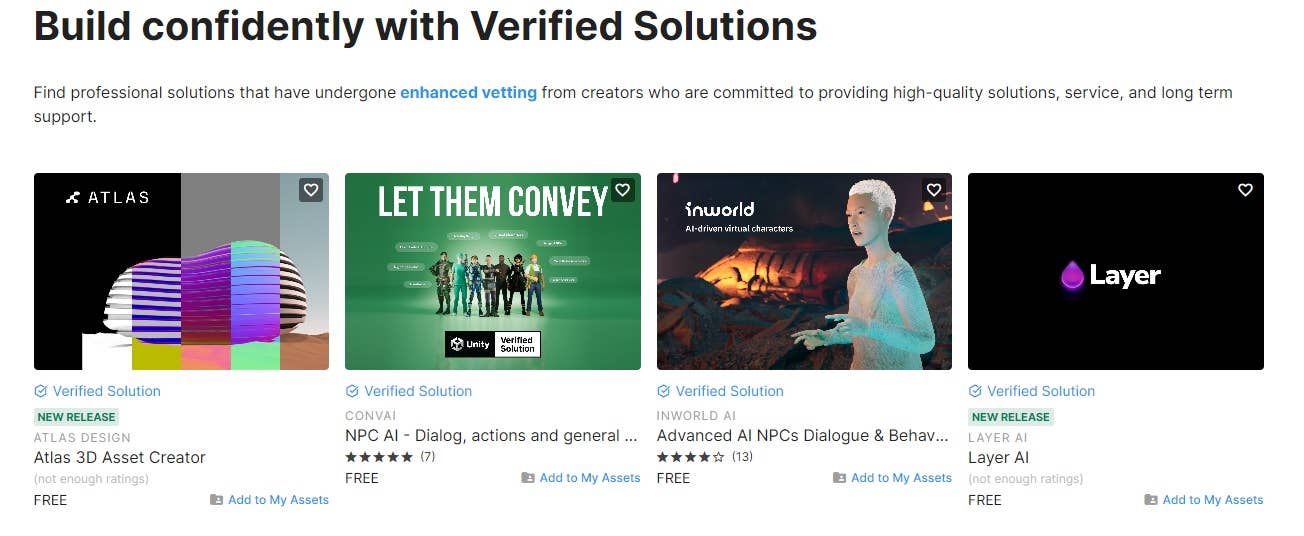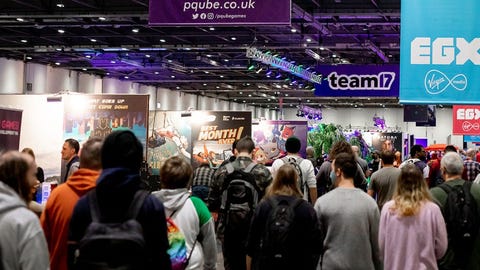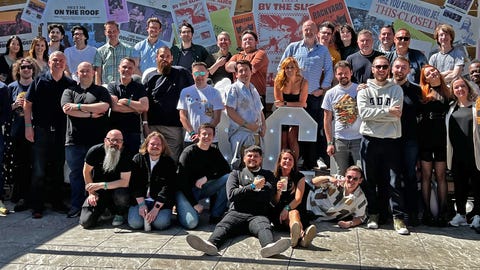Unity's self-combustion engine | This Week in Business
We dive into the Runtime Fee and why it makes perfect sense for Unity management and no sense at all for anyone else
This Week in Business is our weekly recap column, a collection of stats and quotes from recent stories presented with a dash of opinion (sometimes more than a dash) and intended to shed light on various trends. Check back every Friday for a new entry.
Unity had a pretty bad week.
I'm actually writing this lead on Tuesday afternoon, but feeling pretty confident that whatever happens from here on out, this much will be true.
(Friday morning update: Yup.)
Tuesday morning, Unity decided to introduce its new Runtime Fee, which Unity developers of a certain size will have to pay every time their game is installed on a new device after January 1, 2024.
STAT | $0.20 – The fee per install for small developers (Unity Personal subscribers) whose games brought in $200,000 in the past year and have 200,000 lifetime installs to date.
STAT | $0.01 – The fee per install for large developers (Unity Enterprise clients) whose games brought in $1 million in the past year and have lifetime sales of one million or more.
It doesn't sound like a lot, and if a developer just had to pay the fee each time they sold a $60 game, it wouldn't be. But there are problems because these charges are based on game installs, not sales, and Unity has not done a great job communicating what's going on here.
QUOTE | "An install is defined as the installation and initialization of a project on an end user's device." – Unity's initial FAQ on the new fee.
We asked Unity if that would include demos, since those are distinct projects that get installed on end user devices and certainly seem to count.
QUOTE | "No, demos, trials, game bundles and giveaways - like the Humble Bundle - do not count as installs." – A Unity spokesperson, in an email response to use on Tuesday afternoon.
Oh, phew! That could have been bad, but thankfully Unity was quick to dispel—
QUOTE | "If it's early access, Beta, or a demo of the full game then yes [it will result in a Runtime Fee]. If you can get from the demo to a full game then yes. If it's not, like a single level that can't upgrade, then no." – A Unity representative in the company's official forums in a thread edited Tuesday night.
What.
How about games included in streaming services? They aren't really installed on an end user's device, so they shouldn't count, right?
QUOTE | "Subscription services, like Game Pass, do count as an install." – Unity's spokesperson responds to our inquiry about how streaming games would be counted for the Runtime Fee.
Bummer, but at least we got an answer I suppose, and now we know developers will be on the hook for—
QUOTE | "As for Game Pass and other subscription services, [Unity Create GM Marc] Whitten said that developers… would not be on the hook, as the fees are charged to distributors, which in the Game Pass example would be Microsoft." – Axios adding key context for Unity's policy Tuesday evening.
That's great, but how will Unity even track this? If I buy a copy of Dear Esther Landmark Edition (made with Unity) on GOG.com, I get a DRM-free copy that does not require any online connection to play. How does Unity tell if I install the game on a hundred computers or none? Or the same computer 100 times?

QUOTE | "We leverage our own proprietary data model, so you can appreciate that we won't go into a lot of detail, but we believe it gives an accurate determination of the number of times the Runtime is distributed for a given project." – Unity's representative tells us the company definitely has a very good, very accurate process for determining how much money you need to pay it, but you're not allowed to know what it is.
Also, even if you did know how many times the Runtime was distributed, that's not the same as how many times it was installed, which is the thing you're actually charging people for.
The company also said it has anti-fraud technology to detect pirated copies of the game being installed so developers won't be charged for those, but we question a) whether such technology exists (If I legally install that DRM-free copy of Dear Esther on my laptop and then on my PC, how exactly does that work differently from me installing it on my laptop and then pirating it by giving a copy to a friend to install on their PC?) and b) how eager Unity will be to invest in technology that will reduce the amount of money it is owed.
Remember when Facebook sent a memo to employees about "friendly fraud" (kids using their parents' credit cards to buy stuff) and why they shouldn't try to stop it? Good times.
Obviously, Unity's new fees did not go over well. A collective of studios pulled Unity and IronSource ads from all their titles as a form of protest, and called upon others to do the same. The developers of Among Us, Going Under, Cult of the Lamb, Totally Accurate Battle Simulator, Slay the Spire, Wizard With A Gun, and Floppy Knights have all publicly said they are inclined to switch engines if the changes go through.
A lot of those statements talked about trust, because trust is crucial for developers using a commercial game engine. Games can take years to build, and if a developer is going to commit to building a project in Unity, Unity needs to commit to supporting them over that span. And Unity knows this.
QUOTE | "It's a huge commitment to us. Because as soon as we bet on that platform, we have to stay convicted to it for a very long time. Because creators will download it and start using it, and once we've said we're going to support the platform, we need to make sure they know we're there." - Unity Create VP Marc Whitten told us earlier this year why Unity has to think in the long-term every time it adds support for a new platform or a technology like VR.
I don't think the problem with Unity's new Runtime Fee is that Unity botched the messaging, although it definitely did that. It's not that this new fee is a prime example of enshittification, although it definitely is that, too. I'm not even sure the problem is the extra money it takes out of developers' pockets.
I think the real problem here is trust.
Trust is essential in any relationship, personal or professional, and trust is something Unity has squandered a bit of lately. Like when developers expressed widespread concerns about a future where employers replaced them with AI and Unity decided there was no time like the present.
Or when one of the vetted and verified third-party AI solutions it offered was not so much "using cutting-edge generative 3D AI technology to enable the creation of assets and virtual worlds" as it was "using stolen assets."

On top of that, game developers work in a notoriously unstable field with precious little job security, so it probably didn't instill much trust in Unity when the company laid off nearly 300 people in January, even though Riccitiello said he was "thrilled with the work they've done" in one group's case. That trust might have taken another hit when Riccitiello cut 600 more jobs a few months later saying the shrinking headcount was "all about setting ourselves up for higher growth."
As for this week, Unity had an arrangement with these developers that they understood, and one day Unity decided to change that arrangement for its own benefit, without consultation or recourse, in a way that will impose additional costs on developers for as long as their games continue to be installed, which is entirely outside their control at this point.
So even if you're a successful developer who can take the financial hit of the new fee, if you see that Unity is willing to do this, would you trust it not to do it again? Would you trust Unity to not unilaterally change the deal in other ways that disadvantage you? If you stick around and show Unity that you're willing to put up with this violation, how can you trust it won't take it that much further next time?
And if you're not a Unity developer yet, how could you possibly trust that it is worth the time and effort it takes to learn the engine having seen what the company is willing to do? If you're building a business, you reasonably want stability from the partnerships you rely on. Unity's Runtime Fee this week – both the fee itself and the haphazard, ill-advised way it has been rolled out – show that Unity doesn't put much value in stability.
The reason Unity did this
So why would Unity kick such a hornet's nest here? I hope you won't think me too cynical when I say it's about profit. Or more precisely, the lack thereof.
STAT | $2.6 billion – Unity's lifetime accumulated deficit over 19 years of operations, a figure we got by combining the $2.2 billion lifetime debt of its last annual report with the $447 million in net losses it reported for the first two quarters of its current fiscal year.
That's a lot! It has also doubled in pretty short order.
STAT | $1.3 billion – Unity's lifetime accumulated deficit as of December 31, 2021.
Unity has never had a profitable quarter in its history. It has posted modest operating profits in the past three quarters for the first time ever, but I imagine there are lots of businesses whose books look better if you ignore income taxes, depreciation of property and equipment, amortization of intangible assets, millions in restructuring costs associated with laying people off because you think it's a healthy habit to get into, and of course stock-based compensation.
STAT | $494 million - The cumulative stock-based compensation Unity reported paying out over its past three quarters.
STAT | $152 million – The cumulative "profit" Unity reported over those same three quarters.
Speaking of stock-based compensation, there's been some coverage of recent stock sales made by Unity CEO John Riccitiello with the implication that it was insider trading because he knew this Runtime Fee would go over like a lead balloon and sink the stock price.
I would stop short of saying Riccitiello would never – he was after all president at EA during a span where the SEC reportedly investigated the company for stock options backdating (as was the fashion in the games industry at the time) – I will point out that the vast majority of Riccitiello's pay at Unity comes in the form of stock and stock options, and the reported amount he sold is almost negligible compared to what he would have left.
Riccitiello's total compensation last year was $11.8 million, but the actual cash part of that was just $380,000, which is still a fabulous amount of money in absolute terms but around Unity's San Francisco headquarters is about enough to get you a two-bedroom apartment with mold problems. (Also, Whole Foods cashiers get super snippy when you try to pay with stock options.)

When we spoke with Riccitiello last year about Unity's decades-long bubble bath in red ink, he explained it was simply the company's strategy, where it took losses in order to fuel growth.
QUOTE | "Should you be profitable? Well we could be, but we wouldn't be serving the industry in the ways we do now. Our market shares wouldn't have increased." – Riccitiello, noting that Unity's market share went from the low teens to over 70% as a result of the strategy.
QUOTE | "Avoid references to markets or market shares or dominance." - A Google internal document surfaced by the Justice Department this week in its antitrust trial against the search giant, as reported by Bloomberg. The company has spent decades coaching employees to avoid certain words and phrases since they can be red flags for monopolistic behavior.
The emphasis on growing market share is understandable, but companies don't exist to grow market share. They exist to earn money. Market share is just a means to that end. And you're really only going to be willing to lose billions to build your market share if you know you can take it all back and then some down the road.
First, you make yourself essential to the market, even if it costs you billions to get there. Then once you hit a threshold – let's say, I don't know, 70% of the market – you lean into the enshittification process. You charge more for your services, you give your customers worse terms, you turn the heat up slowly and continuously, confident in the knowledge that people are so locked in to your business and have so few viable alternatives that they may grumble but they will ultimately put up with it.
What are they going to do? Not use Unity? Are your developers familiar with alternative engines? The competition for top talent is already fierce; how much tougher will it be if you're hiring for a proprietary engine? If you jump to something like Unreal, how do you know Epic won't do the exact same thing once you're invested in their software? I see a lot of developers talking about Godot, but I also see developers talking about Linux whenever Microsoft pulls some underhanded shenanigans with Windows and that doesn't seem to have cracked the OS market wide open.
Unity lit money on fire for decades to buy a market advantage that overrules the basic economic incentives that supposedly ensure free markets work best for customers
And what about the developers of existing Unity hits like Call of Duty Mobile, Pokémon Go, and Marvel Snap? If they aren't happy with these changes are they supposed to rebuild their games from scratch in another engine? Take them down entirely just to avoid racking up fees?
Unity lit money on fire for decades to buy a market advantage that overrules the basic economic incentives that supposedly ensure free markets work best for customers. It was successful in doing that because it's very hard for a sustainable business to compete against one that is fine losing billions of dollars.
And it's such a common strategy in so many industries today that there's just no sense of horror or outrage from the onlookers. Industry watchers and Serious Business People have seen this play out so many times they just acknowledge it's happening and treat it as if it's a perfectly cool and normal thing and not illegal predatory pricing.
QUOTE | "Pricing below your own costs is not a violation of the law unless it is part of a strategy to eliminate competitors, and when that strategy has a dangerous probability of creating a monopoly for the discounting firm so that it can raise prices far into the future and recoup its losses." – The FTC explains that this strategy is basically illegal, even though it hasn't had much luck getting courts to agree.
QUOTE | "The market's reaction to the blowback that Unity is receiving from the developer community may be overdone, particularly as developers have few lower-cost options to turn to… Given the utility provided by Unity's solutions and its dominant market share within mobile gaming, we do not anticipate a rush for the exits from its core customers." – In a note to investors Wednesday, Wedbush analyst Michael Pachter says Unity should be fine because the market lacks viable competitors.
QUOTE | "When it comes to 'fair', it usually depends on who you ask. From Unity's (and likely its shareholders') point of view, it has technically been subsidising developers' work (i.e., operating at a substantial GAAP-basis loss) every year since inception." – In a guest column on Thursday, Midia Research's Karol Severin suggests it could be seen as fair for Unity to add this Runtime Fee because it has lost so much money over the years.
The difference here is that Unity deliberately chose to lose money. Unity set its terms and prices for developers every step of the way knowing that they would not be profitable. Developers did not choose this strategy for Unity, so Unity cannot insist that they now make the company whole.
Unity also never told developers this was an exchange, a sweetheart deal now in exchange for Unity putting the screws to them later. In fact, that was pretty much the opposite of the sales pitch.
QUOTE | "There's no royalties, no fucking around. It's simple." – In 2015, John Riccitiello talks to us about the new Unity business model, contrasting it to the royalty-based model Epic had announced the day before for its Unreal Engine.
Riccitiello was on a bit of a roll that day, so let's let him expound on that thought.
QUOTE | "I do think you could argue that royalties are quite a bit like free-to-play. They sort of hook you and then try to exploit that relationship. That's not what we're trying to do."
No? Because that is 100% what you have done.
QUOTE |"If you were to walk around Unity, you'll find this point about transparency, clarity... democracy is like every other paragraph of every other conversation. It's a deeply embedded value. We thought for a while about things like royalties, [but] we just didn't think it was right. We thought about the nickel-and-dime model of free-to-play, not to implement it, just to see whether it had any implications for us, but we didn't think so."
Obviously Unity's a very different place these days. There's not much clarity, as we've seen from the continual restatements about how the Runtime Fee works and what it covers. There's not much transparency, as Unity isn't telling people how it figures out how much they'll owe. And there certainly isn't much democracy, because Unity's subscribers certainly wouldn't vote for what's happened this week, and it must have happened over the concerns and objections of a whole lot of non-executive Unity employees, too.
The internal pushback against this has actually escalated beyond any reasonable bounds, with police saying the death threat that closed two of Unity's offices yesterday and today was made by an employee.
Before we move on, there's one more quote from that "no royalties, no fucking around" Riccitiello interview that we should get to.
QUOTE | "With Unity, it's capped. It's $75 a month or $1,500 for a perpetual license; we're not nickel-and-diming people and we're not charging them a royalty. When we say it's free, it's free. When we say $75 a month, it's $75 a month. Yeah, you can buy other stuff from us. We're not a one-trick pony, but we're not charging a royalty, which I think is akin to looking for whales."
I don't know what's more hypocritical here, telling people you're not nickel-and-diming them and explicitly nickel-and-diming them with per install fees that range from two dimes to a fraction of a nickel, or throwing shade on whale hunting when you have spent years making tools to help whale hunters hunt whales better and are in the midst of pivoting toward whale hunting yourself.
QUOTE | "The price increase is very targeted. In fact, more than 90% of our customers will not be affected by this change." – In one of its many "clarifications" this week, Unity says the Runtime Fee was designed in such a way that it will bring in a lot of money from a relative handful of its biggest customers.
This of course isn't the first sign that Riccitiello had a change of heart about whale hunting, given his well-publicized remark last year that developers who focus on creativity rather than monetization are "some of the biggest fucking idiots."
The reason Unity did this
One angle I find interesting here is that Unity had alternative methods of enshittification it could have resorted to that would not have resulted in the same blowback.
For example, it could have simply jacked up the cost of its various subscriptions a bit and gestured in the direction of inflation. So if Unity could have padded its coffers without the grief, why upend the status quo like this?
Part of it seems to be a way to upsell developers to get them even more deeply invested in Unity's ecosystem. They can reduce their Runtime Fees by upgrading their subscription program, or using Unity Gaming Services live-ops backend solution or Unity LevelPlay (the IronSource ad monetization platform), which would be an appealing way to increase Unity's market share in other services that it can enshittify down the road.
However impactful this might seem today, Unity believes it's going to be more impactful to the way the industry develops down the road
Beyond that, I suspect another part of the reasoning here is because however impactful this might seem today, Unity believes it's going to be more impactful to the way the industry develops down the road.
We already know Unity management are big believers in AI, and if companies really can use the tech to cut headcount, they'll not only be paying fewer salaries but fewer Unity seat license fees. So if Unity expects its existing (unprofitable) model to be disrupted, it's naturally going to want to adopt a model better suited to the industry landscape of the future.
Fortunately, Unity released a 2023 Gaming Report earlier this year detailing trends it sees shaping that landscape, a number of which would make the Runtime Fee more profitable for the company going forward.
QUOTE | "Studios are starting more mobile-only games compared to 2021" – One of Unity's top five trends to watch.
STAT | 44% - The increase in mobile-only games made by large studios (300+ people) in 2022, according to Unity's 2023 Gaming Report. The report found a slight decline in such projects from mid-size studios (10-49 people), while every other size of studio saw an increase in mobile-only game development.
The Runtime Fee policy is designed with free-to-play games most obviously in mind. It makes no distinction between monetization models, but it's pretty clear where the upside is considering a free-to-play hit can result in one billion downloads while an absurdly successful premium game like Grand Theft Auto 5 has been running strong for a decade and still shipped "just" 185 million copies.
That doesn't mean smaller developers won't be hurt by the fee, especially since they will pay the most per download by far and are the least likely to be running a free-to-play live service game. It's just to say that John Riccitiello's eyes are much more likely to do the Tex Avery horny wolf gag when he's reading about Minion Rush than the latest indie darling.
So if you're seeing a marked shift toward mobile games, especially from the deep-pocketed studios with the greatest ability to produce one of those rare mobile megahits, pivoting your monetization model to take greater advantage of the free-to-play games that dominate the mobile industry makes sense.
QUOTE | "Large studios are increasing the number of multiplatform games" – Another of Unity's top five trends to watch.
Unity found that in 2022, large studios (300 or more people) released 16% more multiplatform games than in 2021, and 110% more compared to 2019. On top of that, mobile was an overwhelmingly common option for multiplatform games. 75% of large studios' multiplatform offerings had a mobile option, as did 100% of upper midmarket (150-299 people) studio's multiplatform titles.
Given how commonly multiplatform players will use the game on multiple platforms (creating multiple installs) and how much more likely these larger studios are to launch the kind of megahits that would pay eternal dividends through Runtime Fees, this is another trend the new change would benefit from.
QUOTE | "In 2022, there were more players but fewer payers"– One more point from Unity's 2023 Gaming Report.
Last year, daily active users went up 8% year-over-year for the median game, while the rate of paying active users went down 2% for games in the top 50th percentile. That may not sound like a ton, but if you pull back to include games in the 90th percentile, the decline in the rate of paying active users was 30%. The average dollar value per transaction was also down 8% for the top 50th percentile, and 17% for the top 90th percentile.
If Unity thinks mobile revenues are going down while the userbase keeps growing, imposing a fee tied to installs instead of revenues makes sense.
I don't think these trends are necessarily going to have massive effects for Unity's business, but the Runtime Fee plan strikes me as an optimization for them, a way to improve Unity's outlook whether the industry evolves this way or that.
Honestly, I think this new Runtime Fee makes perfect sense from a mile-high point of view, if you think about Unity as a business where you just turn whichever dials and pull whatever levers will make the numbers go up the most.
The only problem is it makes no sense at all if you instead think about Unity as a game development tool that game developers should want to use.
The rest of the week in review
STAT | $1.3 billion – How much Embracer paid in 2021 to acquire Gearbox Entertainment, the Borderlands developer it is now reportedly looking to sell.
STAT | $1.5 billion – Embracer's net debt as of June 30. The company's financial situation has prompted a restructuring that has seen it close a number of studios, including Saints Row developer Volition and Campfire Cabal.
STAT | Around 40 people – How many Ascendant Studios developers have been laid off, or about 45% of the company. The AAA studio led by former Call of Duty developer Bret Robbins released its first game, Immortals of Aveum, in August with EA as the publisher.
STAT | 54 people – The number of Ubisoft London employees whose jobs are at risk as Ubisoft announced plans to close the Hungry Shark developer.
STAT | 76% - The week-on-week sales boost Xbox Series X|S hardware received in the UK for the week ending September 2, when Starfield was first made playable.
QUOTE | "Sometimes people are receptive, sometimes they clam up, sometimes they hire us back, and sometimes we never hear from them again. It goes to that systemic nature, and are people going with the flow, or are the DEI efforts just lip service? Or are they wanting to interrupt the status quo?" – Take This executive director Eve Crevoshay says that just because companies make use of the organization's mental health-focused consulting services, that doesn't mean they'll be receptive to the group's feedback.
QUOTE | "So finally we have smartphones that are powerful enough to play a fully fledged console game, with the correct controls, and it will run natively without lag. This feels like the beginning of a major step-change for mobile gaming, and the games industry in general – and yet I have questions and doubts that linger." – Our editor-in-chief James Batchelor takes a closer look at Apple's push to bring current AAA blockbusters to the iPhone 15 Pro.
STAT | 9 – The number of years Stig Asmussen spent at Respawn Entertainment, where he led development on Star Wars Jedi: Fallen Order and Survivor. Asmussen left this week to "pursue other adventures."
STAT | 9 – The number of years Jesse Houston led Phoenix Labs as CEO. We reported this week that studio co-founder Houston and COO Jeanne-Marie Owens are taking more removed roles with the company (director and advisor, respectively). Phoenix Labs' other co-founders Sean Bender and Robin Mayne left the Fae Farm developer earlier this year.
QUOTE | "Piracy is a mixed bag because obviously piracy is what's kept these games alive for the last 20, 30, 40 years. So the community's done a huge service to the industry keeping them alive, better in some cases than some of the companies themselves." – Antstream CEO Steve Cottam discusses the emulation-based retro game streaming service and how he sees it preserving gaming's past.
STAT | Up to $300 million – How much Playtika is paying to acquire Tiles of Fortune developer Innplay Labs.









